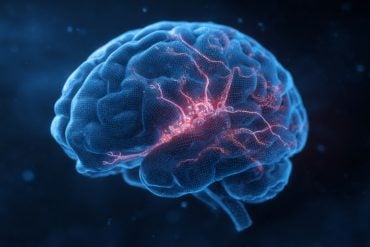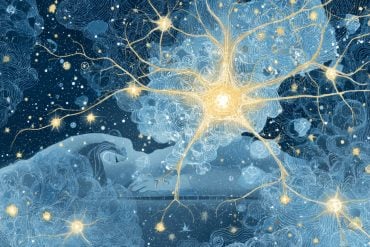Summary: Researchers report estrogen and progesterone can affect memory and problem solving.
Source: Concordia University.
Spatial navigation is easier at that time of the month.
It’s been suggested that women are better at giving directions than men. New Concordia research published in the journal Psychoneuroendocrinology shows that may be thanks to the hormones that trigger the menstrual cycle.
“Women have sometimes reported to doctors that their memory works differently depending on which phase of the menstrual cycle they are in — even during and following pregnancy, or following menopause. This has led scientists to wonder whether estrogen and progesterone could affect memory and problem solving,” says psychology professor Wayne Brake, who co-authored the study.
“Our research shows that, rather than impairing memory in general, estrogen and progesterone may instead cause the brain to favour one memory system or strategy over another.”
Hormones influence problem-solving
For the study, researchers tested 45 women who had regular menstrual cycles. First, participants responded to a “hormonal profile” questionnaire that gathered detailed information on their periods, past pregnancies, contraceptive and synthetic hormone intake history and general life habits.
The participants were then given a verbal memory task, such as remembering a list of words, as well as a virtual navigation task, such as finding their way through a maze in a video game, that could be solved in several ways.
At the end of the experiment, participants were debriefed on how they solved the tasks from beginning to end.
Results were clear: women who were ovulating performed better on the verbal memory task. On the other hand, women tested in their pre-menstrual phase were better at solving spatial navigation tasks.
That proves that women tend to use different strategies to solve tasks — such as navigating a maze or remembering a list of words — depending on where they are in their menstrual cycle.
Essentially, the study shows that the hormonal changes women experience throughout their cycles have a broader impact than previously believed, and have significant effects on how women approach and solve problems.
“This is important scientifically. We and others have previously shown that the levels of estrogen and progesterone in rodents influence different brain regions, affecting various memory systems involved in task-solving,” says Brake.

“For example, when estrogen levels are high, female rats will use one type of memory system or strategy versus another to solve a maze. This is the first study to show that this is also true for women, who solve tasks in different ways based on their hormones”
‘Research is needed to deepen our understanding of the female brain’
For recent PhD graduate Dema Hussain, the study’s lead author, these results point to an ongoing bias in scientific research.
“Traditionally, researchers and scientists have relied on using male participants — and male rats — in studies to develop drugs and treatments for the general population. But we now know that women respond differently than men,” she says.
“I hope that this study emphasizes that more research is needed to deepen our understanding of the female brain, and that efforts must be made to tailor future research to improve our understanding of the effects of female sex hormones on cognition and memory.”
Source: Cléa Desjardins – Concordia University
Image Source: NeuroscienceNews.com image is in the public domain.
Original Research: Abstract for “Modulation of spatial and response strategies by phase of the menstrual cycle in women tested in a virtual navigation task” by Dema Hussain, Sarah Hanafi, Kyoko Konishi, Wayne G. Brake, and Véronique D. Bohbot in Psychoneuroendocrinology. Published online August 21 2016 doi:10.1016/j.psyneuen.2016.05.008
[cbtabs][cbtab title=”MLA”]Concordia University “Menstrual Cycle Affects Memory and Navigation Skills.” NeuroscienceNews. NeuroscienceNews, 21 September 2016.
<https://neurosciencenews.com/menstrual-cycle-navigation-memory-5101/>.[/cbtab][cbtab title=”APA”]Concordia University (2016, September 21). Menstrual Cycle Affects Memory and Navigation Skills. NeuroscienceNew. Retrieved September 21, 2016 from https://neurosciencenews.com/menstrual-cycle-navigation-memory-5101/[/cbtab][cbtab title=”Chicago”]Concordia University “Menstrual Cycle Affects Memory and Navigation Skills.” https://neurosciencenews.com/menstrual-cycle-navigation-memory-5101/ (accessed September 21, 2016).[/cbtab][/cbtabs]
Abstract
Modulation of spatial and response strategies by phase of the menstrual cycle in women tested in a virtual navigation task
Different memory systems are employed to navigate an environment. It has been consistently shown in rodents that estrogen impacts multiple memory system bias such that low estradiol (E2) is associated with increased use of a striatal-mediated response strategy whereas high E2 increases use of a hippocampal-dependent spatial memory. Low E2 also enhances performance on a response-based task whereas high E2 levels improve learning on a spatial task. The purpose of the present cross-sectional study was to investigate navigational strategies in young, healthy, naturally cycling women. Participants were split into either an early follicular (i.e., when E2 levels are low), ovulatory (i.e., when E2 levels are high) or mid/late luteal (i.e., end of the cycle, when E2 levels decrease and progesterone levels rise) phase group, using self-reported date of the menstrual cycle. Serum hormone level measurements (E2, progesterone, testosterone) were used to confirm cycle phase assignment. Participants were administered a verbal memory task as well as a virtual navigation task that can be solved by using either a response or spatial strategy. Women tested in the ovulatory phase, under high E2 conditions, performed better on a verbal memory task than women tested during the other phases of the cycle. Interestingly, women tested in the mid/late luteal phase, when progesterone is high, predominantly used a spatial strategy, whereas the opposite pattern was observed in the early follicular and ovulatory groups. Our data suggest that the specific memory system engaged differs depending on the phase of the menstrual cycle and may be mediated by both E2 and progesterone, rather than E2 alone.
“Modulation of spatial and response strategies by phase of the menstrual cycle in women tested in a virtual navigation task” by Dema Hussain, Sarah Hanafi, Kyoko Konishi, Wayne G. Brake, and Véronique D. Bohbot in Psychoneuroendocrinology. Published online August 21 2016 doi:10.1016/j.psyneuen.2016.05.008






